Discover financial empowerment resources
Discover financial empowerment resources
Financial empowerment (FE) is an approach to poverty reduction that focuses on improving the financial security of people living on low income. Evidence shows that embedding FE interventions into municipal welfare, employment, housing, shelter and health services can significantly boost service...

Recover and Rebuild: Helping Canadians build financial security during the pandemic and beyond The 2021 ABLE Financial Empowerment (FE) virtual series is a collection of online financial empowerment events designed to provide frontline FE practitioners, FE stakeholders, policy-makers and...

February Employment Insurance (EI) statistics reflect labour market conditions as of the week of February 14 to 20. Ahead of the February reference week, non-essential businesses, cultural and recreation facilities, and in-person dining reopened in many provinces, subject to capacity limits and...
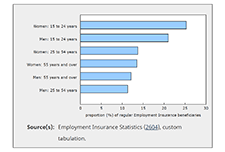
February Labour Force Survey (LFS) data reflect labour market conditions during the week of February 14 to 20. In early February, public health restrictions put in place in late December were eased in many provinces. This allowed for the re-opening of many non-essential businesses, cultural and...
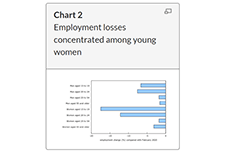
The September Labour Force Survey (LFS) results reflect labour market conditions as of the week of September 13 to 19. At the beginning of September, as Canadian families adapted to new back-to-school routines, public health restrictions had been substantially eased across the country and many...
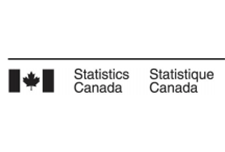
In this presentation, Uttam Bajwa, Global Health and Research Associate with the Dalla Lana School of Public Health, University of Toronto, reports on tax filing challenges and opportunities for Canadians living on low incomes. This includes the challenges of not knowing what to do, fear and...
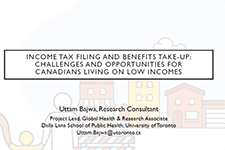
This is the full Vital Signs Report for Toronto in 2016. The Foundation partners with many researchers to produce the Toronto’s Vital Signs® Report. The Report is compiled from current statistics and studies, identifying progress we should be proud of and challenges that need to be addressed. It...
This is an infographic summarizing Canadian Community Health Survey data on food insecurity. V=Food insecurity - the inadequate or insecure access to food due to financial constraints - is a serious public health problem in Canada. It negatively impacts physical, mental, and social health, and...
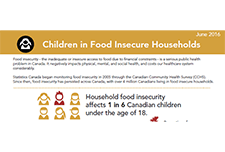
This is a graphic and brief from the PROOF research group. Food insecurity - the inadequate or insecure access to food due to financial constraints - is a serious public health problem in Canada. It negatively impacts physical, mental, and social...
This is a brief and infographic on policy recommendations relating to food insecurity in Canada. Food insecurity is rooted in material deprivation, with low income being the strongest predictor. Research has demonstrated reductions in food insecurity where social policies have improved the material...
In 2008, Toronto Public Health released The Unequal City: Income and Health Inequalities in Toronto. The report showed that there were differences in health between income groups in Toronto, that low income groups had worse health for most health status indicators, and that differences in health...
The Unequal City 2015: Income and Health Inequities report provides a summary of the details found in this technical document. These details include: The methodology used to explore current income-related health inequities in Toronto and the change in those inequities over time; The population...
Population health survey data are not routinely linked to specific health care organizations, limiting organizational capacity to assess performance improvements in relation to the observed risk and prevalence of differences in health. The lack of demographic information hinders the growth of...
